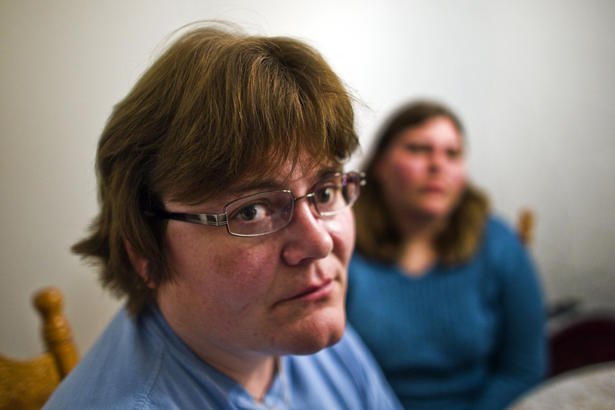
Heather Stewart's mother was killed in 2009 by Stewart's boyfriend, who was out on bail. Stewart lost her left eye and her daughter Amanda Huntley (background) was beaten. Now she's headed to Ottawa to try and strengthen laws that keep abusers in jail.
ANDREW WALLACE/TORONTO STAR
Heather Stewart did everything victims of domestic violence are told to do. She left her abusive partner. She changed the locks on her doors. She went to the police.
None of it could protect her from the vicious attack Horace Weekes was determined to carry out. Weekes’ rampage through Stewart’s Mississauga townhouse left her mother dead and her daughter’s body blackened with bruises.
The left side of Stewart’s face was crushed by repeated hammer blows. Her face would later be reconstructed but doctors could not save her left eye.
A year and a half on, Stewart, 45, is headed for Ottawa to plead for changes to the law that would keep abusers behind bars. An online petition circulating since March has attracted close to 2,200 signatures, many from other battered women.
MP Joe Comartin, justice critic for the NDP, has agreed to present the petition to the House of Commons next Monday. Stewart and her supporters hope it will eventually lead to a private member’s bill called Helen’s Law, named for her 71-year-old mother, Helen Slichta.
“I don’t want sympathy when I tell people what happened,” Stewart says, sitting in the new condominium she shares with daughter, Amanda Huntley, now 25. The pair couldn’t return to the townhouse where they were terrorized and Slichta was killed.
“What’s happened, happened. My mom always said things happen for a reason. The laws need to be changed.”
Stewart has found comfort in Barbara Mills, an advocate for victims of domestic violence. Mills helped Stewart draft the petition and will accompany her to Ottawa next week.
“I think if there’s enough political will, the federal government can address violence against women,” says Mills. “Excuse the pun, but let them stand up and look her in the eye . . . and tell her that it can’t be done.”
Helen’s Law is yet to be drafted but Mills says it would include reforms to bail legislation that would allow judges to keep abusers locked up. It’s widely recognized that offenders in abuse cases are at a very high risk to reoffend at the time of release.
Weekes had been in and out of jail in the months leading up to the attack on May 30, 2009.
After Stewart ended their relationship, Weekes left voicemail messages threatening to kill her and himself. One evening, he hid in the bushes in front of her house and unleashed a torrent of verbal abuse when she arrived home.
Those incidents led to a charge of criminal harassment. Weekes pleaded guilty and was ordered not to contact his ex.
The phone calls persisted. He pleaded guilty to breaching the court order and served 30 days in jail. With no history of actual violence, his release was inevitable.
Afterward, he stole a key to Stewart’s house, snuck in while she was out and lay in wait in a closet, drunk and armed with a knife and hammer. He waited for the women to go to sleep and then attacked them.
“Until the law is changed, there is nothing the judges can do,” Mills says. “We can’t blame the police, in her particular case, they did their job. It was the judge that didn’t have the power to hold this man down after two breaches.”
Weekes pleaded guilty to second-degree murder and was sentenced to life with no possibility of parole for 20 years. He received a 15-year concurrent sentence for attempting to murder Stewart.
Stewart says she has no faith in the justice system but that it could be restored if her push for change is successful.
“Then my mother’s death will not be totally in vain.”